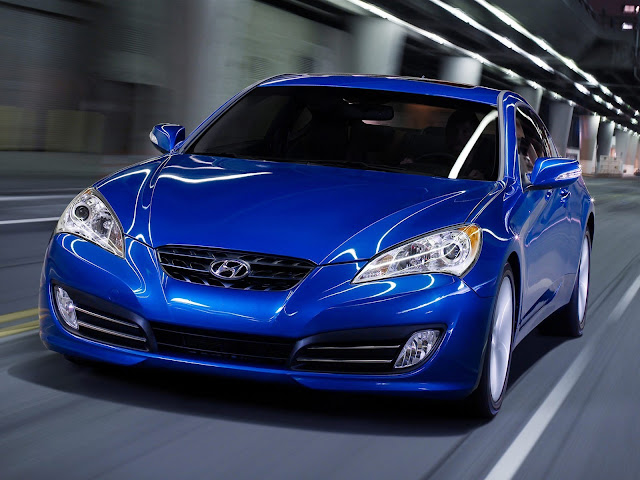
Hyundai Motor Company
The Hyundai Motor Company is a South Korean multinational automotive manufacturer headquartered in Seoul, South Korea. The company was founded in 1967 and, along with its 32.8% owned subsidiary, Kia Motors, together comprise the Hyundai Motor Group, which is the world's fifth largest automaker based on annual vehicle sales in 2012. In 2008, Hyundai Motor was ranked as the eighth largest automaker.[10] As of 2012, the Company sold over 4.4 million vehicles worldwide in that year, and together with Kia, total sales were 7.12 million.
Chung Ju-Yung founded the Hyundai Engineering and Construction Company in 1947. Hyundai Motor Company was later established in 1967. The company's first model, the Cortina, was released in cooperation with Ford Motor Company in 1968. When Hyundai wanted to develop their own car, they hired George Turnbull in February 1974, the former Managing Director of Austin Morris at British Leyland. He in turn hired five other top British car engineers. They were Kenneth Barnett body design, engineers John Simpson and Edward Chapman, John Crosthwaite ex-BRM as chassis engineer and Peter Slater as chief development engineer. In 1975, the Pony, the first Korean car, was released, with styling by Giorgio Giugiaro of ItalDesign and powertrain technology provided by Japan's Mitsubishi Motors. Exports began in the following year to Ecuador and soon thereafter to the Benelux countries.
In 1986, Hyundai began to sell cars in the United States, and the Excel was nominated as by Fortune magazine, largely because of its affordability. The company began to produce models with its own technology in 1988, beginning with the midsize Sonata. In the spring of 1990, aggregate production of Hyundai automobiles reached the four million mark. In 1991, the company succeeded in developing its first proprietary gasoline engine, the four-cylinder Alpha, and also its own transmission, thus paving the way for technological independence.
Hyundai has invested in manufacturing plants in North America, India, the Czech Republic, Russia, China and Turkey as well as research and development centres in Europe, Asia, North America and the Pacific Rim. In 2004, Hyundai Motor Company had $57.2 billion in sales in South Korea making it the country's second largest corporation, orchaebol. Worldwide sales in 2005 reached 2,533,695 units, an 11 percent increase over the previous year. In 2011, Hyundai sold 4.05 million cars worldwide and the Hyundai Motor Group was the world's fourth largest automaker behind GM, Volkswagen and Toyota - a distinction it earned when it surpassed Ford Auto Group in 2009. Hyundai vehicles are sold in 193 countries through some 5,000 dealerships.
The Hyundai brand power continues to rise as it was ranked 65th in the 2007 Best Global Brands by Interbrand and BusinessWeek survey, with brand value estimated at $5.0 billion. Public perception of the Hyundai brand has been transformed as a result of dramatic improvements in the quality of Hyundai vehicles. As of 2011, it is the world's fastest growing car brand for two years running.
In response, Hyundai began investing heavily in the quality, design, manufacturing, and long-term research of its vehicles. It added a 10-year or 100,000-mile (160,000 km) power train warranty (known as the Hyundai Advantage) to its vehicles sold in the United States. By 2004, sales had dramatically increased, and the reputation of Hyundai cars improved. In 2004, Hyundai tied with Honda for initial brand quality in a survey/study from J.D. Power and Associates, for having 102 problems per 1000 vehicles. This made Hyundai second in the industry, only behind Toyota, for initial vehicle quality. The company continued this tradition by placing third overall in J.D. Power's 2006 Initial Quality Survey, behind only Porsche and Lexus. Hyundai is ranked number 4 in World's Most Admired Companies under the motor vehicles section of CNN, after BMW Volkswagen and Daimler in 2011.Hyundai incorporated a new manufacturing facility, Hyundai Motor Manufacturing Alabama, in April 2002. The new plant in Montgomery, Alabama was completed during 2004, at a cost of $1.7 billion. Production started in May 2005. It employed more than 3,000 workers in 2012. Currently, the plant assembles the Hyundai Elantra, the Hyundai Sonata, and the Hyundai Theta engine. It is Hyundai's second attempt at producing cars in North America since Hyundai Auto Canada Inc.'s plant in Quebec closed in 1993.






No comments:
Post a Comment